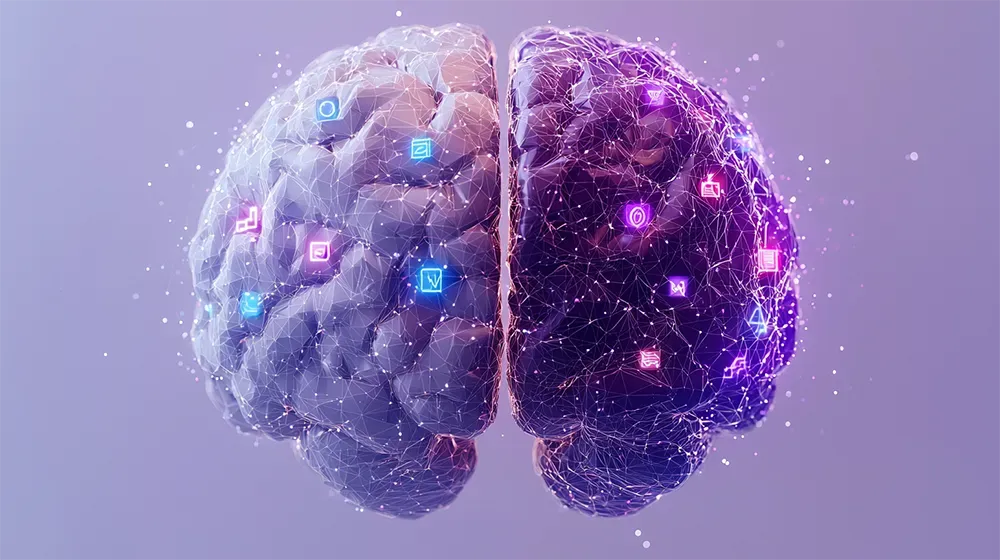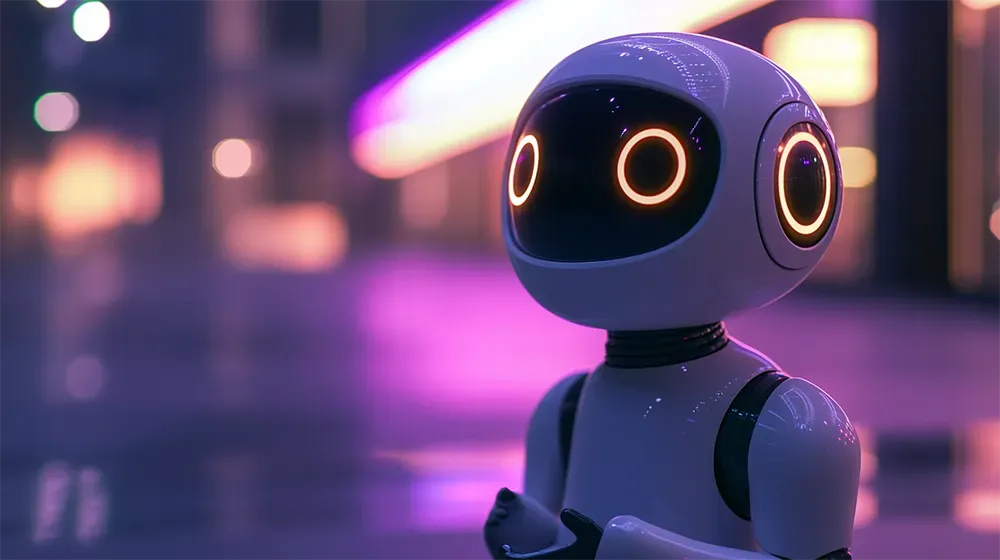Understanding AI with an Innovation Keynote Speaker's Help

Understanding AI with an Innovation Keynote Speaker's Help
Artificial intelligence (AI) has become an increasingly prevalent topic in recent years, capturing the curiosity and imagination of people across various industries. From healthcare to finance, AI is transforming the way we live and work. However, understanding the intricacies of this complex technology can prove to be a daunting task. Thankfully, with the guidance of an innovation keynote speaker, demystifying the basics of AI becomes an engaging and enlightening experience.
Understanding the Basics of Artificial Intelligence
Before delving into the vast world of AI, it is important to grasp the fundamentals. At its core, AI refers to the ability of machines to mimic human intelligence and perform tasks that typically require human intervention. This groundbreaking technology encompasses a wide range of applications, including speech recognition, problem solving, and decision-making.
AI can be classified into two main categories: narrow AI and general AI. Narrow AI, also known as weak AI, is designed to perform specific tasks and functions within predefined limitations. For instance, virtual assistants like Siri and Alexa are examples of narrow AI. These virtual assistants are programmed to understand and respond to specific commands, such as setting reminders, playing music, or answering questions. They excel at their designated tasks but lack the ability to perform tasks outside their programmed capabilities.
On the other hand, general AI is far more advanced, capable of understanding, learning, and adapting to a broad range of tasks on par with human intelligence. Imagine a machine that can not only understand and respond to commands but also learn from its experiences, make decisions, and even engage in creative endeavors. General AI aims to replicate human-like intelligence and is often portrayed in science fiction as highly autonomous and capable of performing any intellectual task a human can do.
Despite being an aspirational goal, general AI remains an active area of research and development. Scientists and engineers are continuously pushing the boundaries of AI, striving to create machines that possess human-like cognitive abilities. However, achieving general AI is a complex and multifaceted challenge that requires advancements in various fields, including computer science, neuroscience, and cognitive psychology.
The development of AI is driven by algorithms and machine learning. Algorithms are the set of instructions that enable machines to carry out specific tasks. In the context of AI, algorithms are designed to process data, make decisions, and perform various cognitive functions. These algorithms form the backbone of AI systems, allowing machines to analyze information, recognize patterns, and generate intelligent responses.
Machine learning, on the other hand, refers to the process of training machines to improve their performance over time through data analysis. It involves feeding large amounts of data into AI systems and allowing them to learn from this data, identify patterns, and make predictions or decisions based on what they have learned. Machine learning encompasses various techniques, including supervised learning, unsupervised learning, and reinforcement learning.
Supervised learning involves training AI systems using labeled data, where the desired output is already known. The AI system learns to associate specific inputs with corresponding outputs, enabling it to make predictions or classifications when presented with new, unlabeled data.
Unsupervised learning, on the other hand, involves training AI systems using unlabeled data. The AI system learns to identify patterns, similarities, or anomalies in the data without any predefined labels. This type of learning is often used for tasks such as clustering, where the AI system groups similar data points together based on their inherent similarities.
Reinforcement learning is a type of learning where AI systems learn through trial and error. The AI system interacts with its environment, receives feedback or rewards based on its actions, and adjusts its behavior accordingly to maximize the rewards. This type of learning is often used in tasks that require decision-making and optimization, such as playing games or controlling autonomous vehicles.
By understanding these basic concepts, you can begin to appreciate the immense potential of AI and its impact on our daily lives. From virtual assistants that make our lives more convenient to advanced AI systems that revolutionize industries, AI has the power to transform the way we live, work, and interact with technology. As AI continues to evolve and advance, it is crucial to stay informed and engaged with this rapidly changing field.
How an Innovation Keynote Speaker Explains AI
Artificial intelligence may seem intimidating to the uninitiated, but with the help of an innovation keynote speaker, the complexity transforms into clarity. These experts have the ability to bridge the gap between technical jargon and everyday conversation, making AI accessible and relatable.
An innovation keynote speaker takes a personalized approach to AI education, using real-life examples and analogies to illustrate complex concepts. By breaking down the subject matter into digestible nuggets, they help the audience grasp the intricacies of AI in a way that is engaging and memorable.
Imagine sitting in a packed auditorium, eagerly awaiting the start of an innovation keynote speech on artificial intelligence. The stage is set with state-of-the-art technology, and the atmosphere is buzzing with anticipation. As the speaker takes the stage, you can feel the energy in the room intensify. This is no ordinary lecture; it's an immersive experience designed to captivate and educate.
The innovation keynote speaker begins by sharing a personal story about how AI has impacted their own life. They recount a time when they were amazed by the capabilities of a virtual assistant that could anticipate their needs and provide helpful suggestions. This relatable anecdote instantly connects with the audience, making them realize that AI is not just a distant concept, but something that already surrounds them in their daily lives.
As the speech progresses, the innovation keynote speaker dives deeper into the world of AI, using captivating visuals and interactive demonstrations to bring the technology to life. They explain how AI algorithms are trained to recognize patterns and make predictions, using examples from various industries such as healthcare, finance, and transportation.
One particularly fascinating case study involves the use of AI in healthcare. The speaker explains how machine learning algorithms can analyze vast amounts of medical data to detect patterns that human doctors might miss. This breakthrough has the potential to revolutionize the field, leading to more accurate diagnoses and personalized treatment plans.
The innovation keynote speaker also highlights the ethical considerations surrounding AI, sparking a thought-provoking discussion among the audience. They delve into topics such as bias in AI algorithms and the importance of transparency and accountability in the development and deployment of AI systems.
Throughout the presentation, the innovation keynote speaker encourages audience participation, inviting questions and facilitating group discussions. This interactive approach ensures that everyone remains engaged and actively involved in the learning process. Attendees leave the keynote speech not only with a better understanding of AI but also with a renewed sense of curiosity and excitement about its potential.
In conclusion, an innovation keynote speaker is a master at demystifying artificial intelligence. Through personalized storytelling, relatable examples, and interactive presentations, they make AI accessible and inspire innovation. So, the next time you find yourself grappling with the complexities of AI, consider seeking the guidance of an innovation keynote speaker who can unlock the secrets of this transformative technology.
Importance of AI in Today's Technological Landscape
In today's rapidly evolving technological landscape, AI has emerged as a crucial player. Its impact can be seen across a wide range of sectors, revolutionizing operations, enhancing efficiency, and creating new opportunities.
In healthcare, AI has the potential to transform patient care, enabling faster and more accurate diagnoses, predicting disease outbreaks, and assisting in drug discovery. In finance, AI algorithms aid in fraud detection, risk assessment, and algorithmic trading. In transportation, AI powers self-driving cars, optimizing routes and reducing accidents. The list of applications goes on, demonstrating how AI has become an indispensable tool for innovation and progress.
By understanding the significance of AI, businesses and individuals can position themselves for success in the digital age. Through collaboration with an innovation keynote speaker, organizations can unlock the potential of AI and leverage its capabilities to gain a competitive edge.
Innovation Keynote Speaker's Approach to AI Education
When it comes to educating audiences about AI, an innovation keynote speaker approaches the topic with a combination of expertise, enthusiasm, and a touch of humor. By establishing a rapport with the audience, they create a comfortable and engaging atmosphere that encourages active participation and learning.
Through storytelling and personalized anecdotes, an innovation keynote speaker puts AI into context, highlighting its relevance to everyday life and sharing insights into the future of this transformative technology. They navigate the ever-changing landscape of AI, staying up-to-date on advancements and emerging trends, ensuring their presentations remain current and insightful.
Furthermore, an innovation keynote speaker dispels common misconceptions surrounding AI, clarifying its limitations and addressing ethical considerations. This holistic approach not only provides a thorough understanding of AI but also encourages critical thinking and responsible adoption.
Practical Applications of AI in Various Industries
The practical applications of AI are vast and far-reaching, transforming multiple industries and empowering businesses to innovate. Let's explore some notable examples:
- Healthcare: AI is revolutionizing healthcare by enhancing disease detection, improving patient outcomes, and streamlining administrative processes. For instance, AI-powered chatbots can provide initial diagnosis and direct patients to appropriate care.
- Finance: In the finance sector, AI algorithms can analyze vast amounts of financial data in real-time, identifying patterns and anomalies that help institutions make informed decisions. AI can also automate customer support, providing personalized recommendations and tailored experiences.
- Manufacturing: AI enables predictive maintenance, minimizing downtime and optimizing production schedules. Machine learning algorithms analyze data from sensors and equipment to identify potential issues before they arise, allowing for proactive solutions and cost savings.
- Retail: AI-powered recommendation engines help retailers personalize the shopping experience, improving customer satisfaction and driving sales. AI can also optimize inventory management, ensuring products are available when and where they are needed.
These examples demonstrate how AI is reshaping industries, boosting efficiency, and paving the way for future innovations.
Conclusion
Understanding AI can be a challenging endeavor, but with the guidance of an innovation keynote speaker, it becomes an enlightening and engaging experience. By breaking down complex concepts into relatable terms and providing practical examples, these experts bridge the gap between technical knowledge and everyday understanding.
AI's importance in today's technological landscape cannot be overstated, as its impact spans across various sectors. By educating themselves about AI and embracing its potential, individuals and businesses can position themselves for success in the digital age.
With an innovation keynote speaker as a guide, the journey to comprehend AI becomes an exciting exploration of the immense possibilities and transformative power of this groundbreaking technology.
Frequently Asked Questions
1. What is artificial intelligence (AI)?
Artificial intelligence (AI) refers to machines' ability to mimic human intelligence and perform tasks that typically require human intervention. It encompasses a wide range of applications, including speech recognition, problem solving, and decision-making.
2. What are the main categories of AI?
AI can be classified into two main categories: narrow AI and general AI. Narrow AI, also known as weak AI, is designed to perform specific tasks within predefined limitations. General AI, on the other hand, aims to replicate human-like intelligence and is capable of understanding, learning, and adapting to a broad range of tasks.
3. How does machine learning contribute to AI?
Machine learning is a crucial component of AI. It involves training machines to improve their performance over time through data analysis. Machine learning algorithms enable AI systems to process data, recognize patterns, and make predictions or decisions based on what they have learned.
Contact a Innovation Keynote Speaker for your event
If you're looking to truly captivate your audience at your next event, consider hiring Dr Mark van Rijmenam, a renowned Innovation Keynote Speaker. With his expertise in Artificial Intelligence, Dr van Rijmenam will transform complex AI concepts into engaging, digestible content that resonates with your audience. He will bring AI to life through real-world examples and interactive presentations, sparking curiosity and inspiring innovation. His unique approach not only educates but also encourages critical thinking about the ethical implications and future potential of AI. Don't miss out on this opportunity to revolutionize your audience's understanding of AI and its impact on our world. Simply complete the form below and we will be in touch within 24 hours to discuss how Dr van Rijmenam can make your event a truly enlightening experience.





